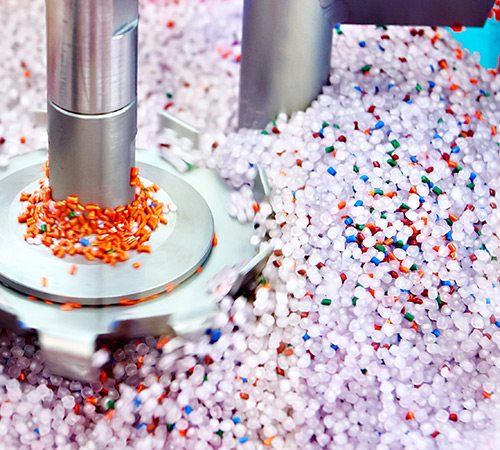You’ve likely heard some astounding and often disturbing facts about global plastic production, plastic waste, and its detrimental environmental impact.
For example, “The amount of plastic produced in a year is roughly the same as the entire weight of humanity.” Or “Decomposing plastic items in landfills can take up to 500 years.”
Facts like these show much to be concerned about, and it’s more important than ever that everyone, from industry and government leaders to individuals and small businesses, take action. It’s just as important to understand that cost-effective plastic recycling technology has only been developing for 25 years. This relatively new industry is trying to keep pace with an insane global appetite for plastic products, and at Recycle 1, our mission is to be part of the solution.
We’ve rounded up some of the latest facts about the impact and current state of plastic recycling.
- About 25% of the plastics produced in the United States are recycled. The other 75% of plastics produced in the U.S. ends up in landfills.
- Recycling that 75% would free up 44 million cubic yards of landfill space annually and save one billion gallons of oil.
Oceanic Impact:
- There is more microplastic (created when plastic waste breaks down into tiny particles) in the ocean than stars in the Milky Way.
- If current trends continue, plastic pollution could outweigh fish pound-for-pound by 2050.
Energy Conservation:
- Recycling one ton of plastics can save 1,000 to 2,000 gallons of gasoline.
- It can also save 5,774Kwh of energy, 16.3 barrels of oil, and 98 million Btus of energy.
- Recycled plastic products require up to 87% less energy to manufacture than new plastic products.
Recycling efforts by individuals, families, and businesses have increased, but there’s still room for improvement:
- In the U.S. alone, ISRI estimates that at least 5 million tons of post-consumer and post-industrial plastics were recycled in 2016.
- In 2016, 5.6 billion pounds of post-consumer plastic, including bottles, bags, film, and non-bottled rigid plastics, were recycled in the U.S.
- Bottles and jars made out of PET plastic (the most recyclable plastic classification) have a 29.9% recycling rate in the U.S. The rest—totaling about 2.4 million tons—is discarded.
- Most recycled plastics are not for repurposing into food-grade products. Instead, they’re for everything from fabrics to building insulation and park benches.
- Most plastics lose their structural quality from recycling and can only be recycled once or twice.
As the recycling industry grows, so does the economic impact, and now plastic scrap has become one of the most essential scrap commodities on the global market.
- Recent estimates indicate that recycling and reuse activities account for roughly 757,000 jobs, $36.6 billion in wages, and $6.7 billion in tax revenues in the U.S.
- Today, the global plastics recycling industry is estimated to be worth $34 billion, and it’s predicted to reach $56 billion by 2026.
- Over 11.7 million tons of plastic scrap valued at nearly $5.2 billion were exported globally in 2016.
- The U.S. generated $730 million in export sales in 2016.
- In the U.S., more than 1,600 business organizations recycle post-consumer plastic items.
More and more plastics are recycled as the industry matures, leading to promising developments in the U.S. and abroad.
- More than 60% of Americans—more than ever before—have access to plastic recycling programs.
- The U.S. processes enough scrap plastic annually to power 10,000 homes for one year.
- In 2016, more than 1.4 billion pounds of post-consumer non-bottle rigid plastics were recovered—four times the amount recycled in 2009.
- Scientists have discovered bacteria that dissolve plastic and are working to develop that further. While still early, plastic-eating bacteria have great potential to work alongside recycling efforts.
If you want your business to be a more significant part of the solution, call us to see how our programs at Recycle 1 can help. We’d love to partner with you! Contact Us
References:
https://www.rts.com/blog/nine-surprising-plastic-recycling-facts/
https://www.epa.gov/sites/production/files/2018-07/documents/2015_smm_msw_factsheet_07242018_fnl_508_002.pdf
https://www.thebalancesmb.com/plastic-recycling-facts-and-figures-2877886
https://www.theguardian.com/environment/2017/jun/28/a-million-a-minute-worlds-plastic-bottle-binge-as-dangerous-as-climate-change
https://news.un.org/en/story/2017/02/552052-turn-tide-plastic-urges-un-microplastics-seas-now-outnumber-stars-our-galaxy#.WLA81BLyvBJ
https://www.nytimes.com/2018/08/06/science/plastics-polymers-pollution.html
https://www.americanchemistry.com/Media/PressReleasesTranscripts/ACC-news-releases/New-Study-Reports-Over-60-Percent-of-US-Population-Has-Access-to-Recycling-Programs-for-Many-Plastics.html
http://www3.weforum.org/docs/WEF_The_New_Plastics_Economy.pdf
http://advances.sciencemag.org/content/3/7/e1700782
http://isri.org/commodities
